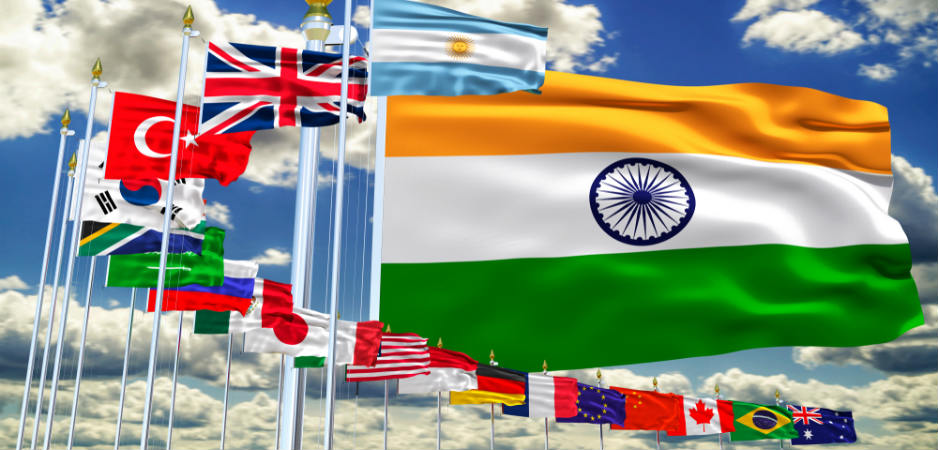The G-20 summit offers India a strategic opportunity to emerge as one of the stabilizing poles in a world with growing geopolitical uncertainty.
Foreign policy has been a key highlight of Indian Prime Minister Narendra Modi’s first term. In the last four years, India’s global standing and diplomatic footprint have substantially expanded. The latest G-20 summit in Argentina is the first to be hosted in South America. It marks a milestone for this evolving global forum of the world’s 20 largest economies.
The G-20 is the child of the 2008 global financial crisis. It is an embodiment of the changing world order where China has emerged as a leading power. The forum has moved beyond its core agenda of stabilizing the world economy. It has emerged as the premier forum for international economic cooperation, a sort of a mini-UN, toward building an open world economy. But the G-20 is regularly criticized as a “talk-shop” peddling a neoliberal agenda with little regard for the developing economies and African continent — South Africa is the sole African representative. The forum has also played an inadequate role in addressing challenges like climate change and reforming global financial institutions.
In Buenos Aires, Modi will be representing the poorest member of the group, with the lowest Human Development Index. But India also happens to be the fastest growing major economy in world. Amid the ongoing US-China trade war, an expanding migration crisis in South America, Brexit and rising tensions between Ukraine and Russia , India has an opportunity to use the G-20 forum to push ahead its underlying theme of building consensus for fair and sustainable development.
The host, Argentina, is itself the showpiece of the perils of neoliberal capitalism. Many Latin American countries continue to struggle when it comes to providing basic human necessities like security and food. The recent currency crisis in emerging markets has impacted Argentina, Turkey, and to a lesser extent, India as well. The future of employment and a sustainable food future are two of the priorities for the G-20 agenda, both have a direct impact on India. India’s position should also be to argue for bringing down stringent migration barriers that target African and Asian workers coming to the West. Barriers on trade in services present another major challenge. Any debate on a sustainable food future is not possible without reaching an agreement on the Doha Round negotiations that have remained stalled since 2008.
Modi might also consider setting up a permanent G-20 secretariat and work with the EU and China to that effect. India should learn from its mistakes during the Non-Aligned Movement and must not hesitate to use the forum to target the state-sponsored terrorism coming out of Pakistan. India’s foreign policy goal at the summit should include highlighting its candidacy for permanent member of the UN Security Council and freedom of navigation in the South China Sea.
Bilateral and trilateral discussions led by US President Donald Trump tend to dominate the G-20. Such an approach undermines the forum and its relevance. India shall do well to represent the voice of the postcolonial developing world and bring back the focus on fair working conditions, agriculture and funding health and energy-related projects in developing economies.
The G-20 summit offers India a strategic opportunity to emerge as one of the poles in a world with growing geopolitical uncertainty. In his statement prior to attending the G-20 summit, Modi focused on “reformed multilateralism” to “strengthen collective action for global good.” It is essential for Indian interests that the G-20 is not reduced to a transatlantic affair and a talkfest of trade lobbies.
The views expressed in this article are the author’s own and do not necessarily reflect Fair Observer’s editorial policy.
Support Fair Observer
We rely on your support for our independence, diversity and quality.
For more than 10 years, Fair Observer has been free, fair and independent. No billionaire owns us, no advertisers control us. We are a reader-supported nonprofit. Unlike many other publications, we keep our content free for readers regardless of where they live or whether they can afford to pay. We have no paywalls and no ads.
In the post-truth era of fake news, echo chambers and filter bubbles, we publish a plurality of perspectives from around the world. Anyone can publish with us, but everyone goes through a rigorous editorial process. So, you get fact-checked, well-reasoned content instead of noise.
We publish 2,500+ voices from 90+ countries. We also conduct education and training programs
on subjects ranging from digital media and journalism to writing and critical thinking. This
doesn’t come cheap. Servers, editors, trainers and web developers cost
money.
Please consider supporting us on a regular basis as a recurring donor or a
sustaining member.
Will you support FO’s journalism?
We rely on your support for our independence, diversity and quality.






